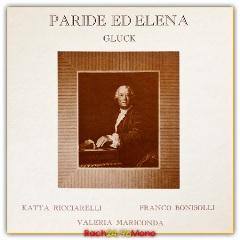Gluck - Paride ed Elena (1973)
Gluck - Paride ed Elena (1973)

1. Side A 2. Side B 3. Side C 4. Side D Paride - Franco Bonisolli Elena - Katia Ricciarelli Amore - Valeria Mariconda Pallade - Carmen Lavani Tenorsolo - Hiroshi Watanabe Maggio Musicale Fiorentino Choir, Settimana Musicale Senese Orchestra, Piero Bellugi - conductor Recorded live at Siena, Tuscany, Italy, September 4, 1973.
The text and the music for the Dramma per musica Paride ed Elena probably originated in Vienna between 1768 and 1770: details of the genesis of the work are not known. Calzabigi may have started the text-book after the premiere of Alceste (December 26th, 1767) and wrote it aloud a letter to Antonio Greppi, already before December 12th, 1768, while Gluck had begun composing at that time, but probably not earlier than in the first months of 1770. The premiere took place on Saturday, November 3rd, 1770 at the Vienna Burgtheater in honor of Peter Leopold, Archduke of Austria and Grand Duke of Tuscany.
This dramma per musica in five acts is a re-telling of the legend of Paris and Helen in a libretto by Ranieri De' Calzabigi, premiered at Vienna's Burgtheater on November 3, 1770. This was the third and last of the composer's Italian reform operas, intended as a panacea to the complexities of opera seria. But, despite the talent of the renowned soprano castrato Giuseppe Millico as Paris, and a conservative style contrasting the city-state characters of militant, angular, and lively Sparta with elegant, gentle and lyrical Phrygia (Trojans), the critics reacted negatively to this opera's "unequal and somewhat strange taste."
The excellent overture, with interesting chromatic modulations and built on quotes from later scenes, introduces the idea of explicit contrasts with its martial Allegro, lyrical melodies, and a cheerful triple-meter dance transformation of the initial march.
In Act I, Paris and Trojan sailors are camped on the shore outside Sparta. The Trojans sing a hymn to Venus to help Paris see Helen. Zeus has chosen Paris to judge who is the most beautiful between Juno, Minerva, and Venus, but Helen is said to be the loveliest. Helen's confidant Cupid (Amore) disguised as Erasto says he will help Paris. A five-movement ballet with divergent styles concludes the act.
Act II depicts the meeting of Helen and Paris. They are immediately infatuated with each other: he declares her as beautiful as Venus, she says other women must be missing him. In "Le belle immagini," Paris, now alone, despairs that he may lose Helen.
Act III opens in the great courtyard of the royal house. Brief, martial music brings on Spartans, Trojans, guards, and athletes. Helen asks Paris to judge the games with her. The contestants offer bare, declarative music in unison and octaves and an energetic dance in dotted rhythms and on-rushing scales. Helen asks Paris for something more lyrical, and, to harp accompaniment, he sings "Quegli occhi belli" lauding Helen's loveliness. In minor keys, Helen expresses embarrassment and chagrin, declares she is moved only by loyalty and virtue, and orders Paris away. He believes the gods have betrayed him, and now he must die. Masking the mood of dolor, the act concludes with a exultant march in C major celebrating the games' close.
In Act IV, Helen, writing to Paris, is portrayed as torn between love and duty in the very moving "Lo potró! Ma frattando, oh infelice." She declares she is betrothed to another, but Paris says he would rather die than leave her.
In Act V, the couple is reunited through a ruse by Cupid, but goddess Pallas Athene is enraged and predicts the horrors of the coming war between the two city-states. Nevertheless, Paris and Helen seal their love ("L'amo! L'adoro!") and Cupid swears to protect them. As the Trojans and couple depart at the shore, the opera ends with several dances and a splendid choral piece interlaced with two arias for Cupid and a duet for Paris and Helen. ---"Blue" Gene Tyranny, allmusic.com
Pięcioaktowa opera Parys i Helena (Paride ed Elena) Christopha Willibalda Glucka do libretta Rainieriego de’ Calzabigiego jest ostatnim z trzech „reformatorskich” dzieł autorstwa tego duetu. Ta próba przywrócenia opery do jej pierwotnego kształtu, uwypuklającego ludzie namiętności i dramaty oraz spajającego słowo z muzyką za życia kompozytora przyjęta została dość chłodno. Wystawiona po raz pierwszy w wiedeńskim Burgtheater 3 listopada 1770 roku z choreografią Jeana-Georgesa Noverre’a została zadedykowana Leopoldowi II, księciu Toskanii i przyszłemu cesarzowi. Opera, oparta na dwóch elegiach w epistolarnej formie najprawdopodobniej autorstwa Owidiusza, opowiada historię konsekwencji sądu Parysa – poszukiwania królowej Heleny oraz ich wspólnej ucieczki do Troi. Angażując pięcioro solistów – Parysa (sopran-kastrat), Helenę (sopran), Amora (sopran), Atenę Pallas (alt) oraz Trojanina (sopran), Gluck rozgrywa zaloty Parysa i pozorowany opór Heleny za pomocą odmiennych stylistyk – królowa Sparty jest w swych unikach ascetyczna, zaś trojański królewicz czaruje śpiewnymi frazami i kusi wirtuozerią. Tym bardziej Parys i Helena godni są uwagi, iż na scenach XX-wiecznych gościli nader rzadko – próba wskrzeszenia miała miejsce dopiero w Sienie w 1973 roku. --- operarara.pl
download (mp3 @320 kbs):
yandex mediafire uloz.to mega 4shared cloudmailru








